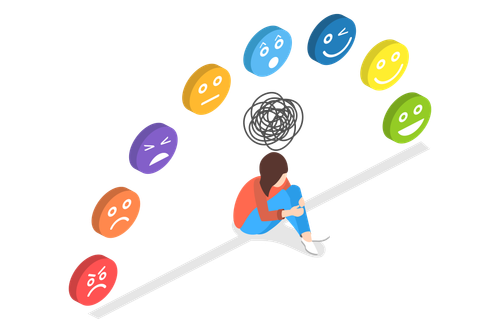Anxiety is a common response to stress that can serve a purpose in our lives, but when it becomes overwhelming or persistent, it can take a toll on our daily experiences and overall sense of well-being. Many people find themselves grappling with ongoing feelings of worry, fear, or unease, about situations. Imagine walking through a serene green forest and suddenly encountering a grizzly bear. In that moment, most will experience a surge of adrenaline as the body prepares to react. This automatic response—heightened heart rate, increased breathing— prepares the body to protect itself (flight, flight & freeze response) which has been essential for our ancestors’ survival. However, in our modern world, our minds sometimes struggle to differentiate between immediate dangers and everyday stressors. This can lead to moments of panic, even when there is no true danger around us. Some individuals may have a heightened sensitivity to perceived threats, possibly due to past experiences or genetics, which can result in anxiety disorders that significantly impact their lives.
Anxiety can lead to mix of physical symptoms—like a racing heart, shortness of breath, or muscle tension—alongside psychological symptoms such as racing thoughts or a profound sense of dread. Anxiety disorders—such as generalized anxiety disorder (GAD), panic disorder, and social anxiety disorder—can vary in how they impact people. Sometimes they are triggered by stressful events or health concerns, and other times they seem to come out of nowhere. While it’s normal to feel anxious from time to time, chronic anxiety can disrupt relationships, work, and overall happiness. If you’re feeling overwhelmed, know that you’re not alone, and help is available. Understanding anxiety is a vital step toward managing it effectively. Common symptoms include:


It’s important to take a moment to reflect on your schedule. Are you finding yourself stretched too thin, without enough time to recuperate and relax? This lack of downtime can lead to feelings of anxiety and even burnout. If reducing your workload feels overwhelming, consider carving out time for yourself, even if it’s just a few hours each week.
Making space for self-care can significantly help ease some of that anxiety. Try to incorporate relaxing activities into your daily routine. Simple pleasures, like taking a warm bath or watching a lighthearted show, can bring some joy and relief. Be mindful of when your body starts to feel tense, and don’t hesitate to use techniques like progressive muscle relaxation or deep breathing to help manage your stress.
Being proactive and planning ahead can also be beneficial. Procrastination can create a cycle of anxiety that feels difficult to escape. Additionally, think about reducing or eliminating caffeine and other stimulants from your diet. They can amplify feelings of alertness and anxiety, which may complicate how you’re feeling.
If you suspect you may be experiencing an anxiety disorder, please know that you’re not alone and it can impact anyone. It’s a good idea to reach out to your doctor, who can help evaluate your situation, explore any underlying causes, and guide you toward appropriate treatment. Remember, it’s also common for anxiety to coexist with addictions. Taking the first step toward understanding your feelings is incredibly important, and you deserve support in this journey.
When it comes to treating anxiety disorders, many find Cognitive Behavioral Therapy (CBT) is an effective option. CBT helps you explore the connections between your thoughts, feelings, and behaviors. It’s a structured, goal-oriented form of talk therapy designed to shed light on unhelpful thinking patterns, known as cognitive distortions or thinking errors, and the behaviors that may be holding you back. By gaining this understanding, you can start to view situations in a more balanced and constructive way. If you’re struggling with anxiety, you’re not alone.
Many people experience challenges like procrastination or perfectionism. Not everyone gravitates towards CBT or prefers a mix of techniques to manage anxiety. Other treatments such as Acceptance and Commitment Therapy (ACT), Dialectical Behavior Therapy (DBT), Solution-Focused Brief Therapy (SFBT), and mindfulness practices, can be helpful. If your anxiety is tied to past trauma, therapies like Eye Movement Desensitization and Reprocessing (EMDR) or Accelerated Resolution Therapy (ART) may offer you the relief you’re looking for. Seeking help is a sign of strength, and there are many paths to finding peace in coping with anxiety.